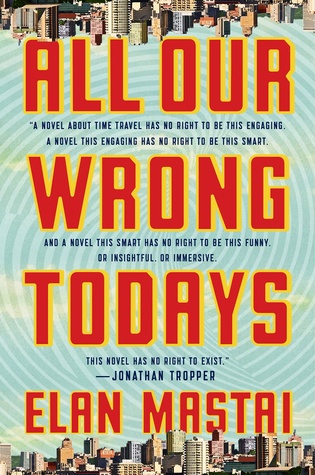
Today and Tomorrow
Our society’s obsession with youth and technology is widely apparent. When it comes to the simplest and easiest ways to roll back the hands of time, technology has given us space-age unguents to smear on the skin and eradicate wrinkles, dyes for our hair, pills to slough the pounds, pills for our cholesterol, pills for our poop, and pills for our peckers.
Technology might be the true fountain of youth.
And if science will be the means to one day turn back time, then science fiction is the way we can do it today. Ever since H.G. Wells urged us to consider time travel in 1895, we’ve hoped each technological advance might get us there with the flip of a switch. But without that portal available to us, we take Wells’ lead and look to the arts to transport us. The muse, it seems, travels back and forth through time, showing up in the writing desks of authors and on the soundstages of filmmakers. Those artists have given us Hank Morgan, Billy Pilgrim, Dr. Who, Kyle Reese, Marty McFly, and Henry DeTamble.
And we can now add to that roster Tom Barren, the protagonist of All Our Wrong Todays(Dutton), the debut novel by Elan Mastai.
The source of all of these conveniences is the Goettreider Engine. It’s John Galt’s kinetic motor, Dr. Emmett Brown’s plutonium, and Hot Tub Time Machine‘s energy drink, Chernobly, rolled into one. The Goettreider Engine was turned on by Lionel Goettreider on July 11, 1965, at 2:03:48 p.m. and never turned off again. That’s the exact moment the world changed forever, suddenly infused with a clean, self-perpetuating energy. No more coal, no more diesel fumes, no more war over oil, just whatever technology the mind could dream up.
Barren’s father is Victor Barren, Ph.D., whose offering on the altar of advancement is — you guessed it — a time machine. It’s been in the planning and building and testing stages when we enter the story in 2016. A team of chrononauts trains to be the first to go back in time, to the moment Goettreider flipped the ON switch in 1965, because the only way Victor’s wayback machine can find its way is to follow the engine’s tau radiation signal.
Anyway, it all sounds very technical — and it is — but it’s also very human, and the humanity is what makes this book so engaging and entertaining. It’s that rubbing together of technology and heart, emotion and theory jumping back and forth in the same way Barren’s world and ours coexist.
What’s the first thing we learn as sci-fi consumers when it comes to traveling back in time? That’s right: Don’t change anything! Well, Barren ends up in 1965 and — spoiler — he changes some stuff. It’s not his fault, time travel is glitchy, but this glitch keeps the world on a trajectory that sees the only technology being smart phones, remote car door locks, internet porn, and drip coffee. Boring.
Barren has to figure out how to make it all right again. The thing is, he likes portions of our world. His mother’s still alive and he likes his father better, he has a sister who didn’t exist back in utopia, and there’s a girl, Penny, whom he lost in his world. So what does our hero do? Well, you’ll have to jump into tomorrow when you can go to the bookstore and get your own copy of All Our Wrong Todays to find that out. I suggest you don’t waste any time in doing so; there’s no telling what might happen.
This review originally appeared in The Memphis Flyer.
